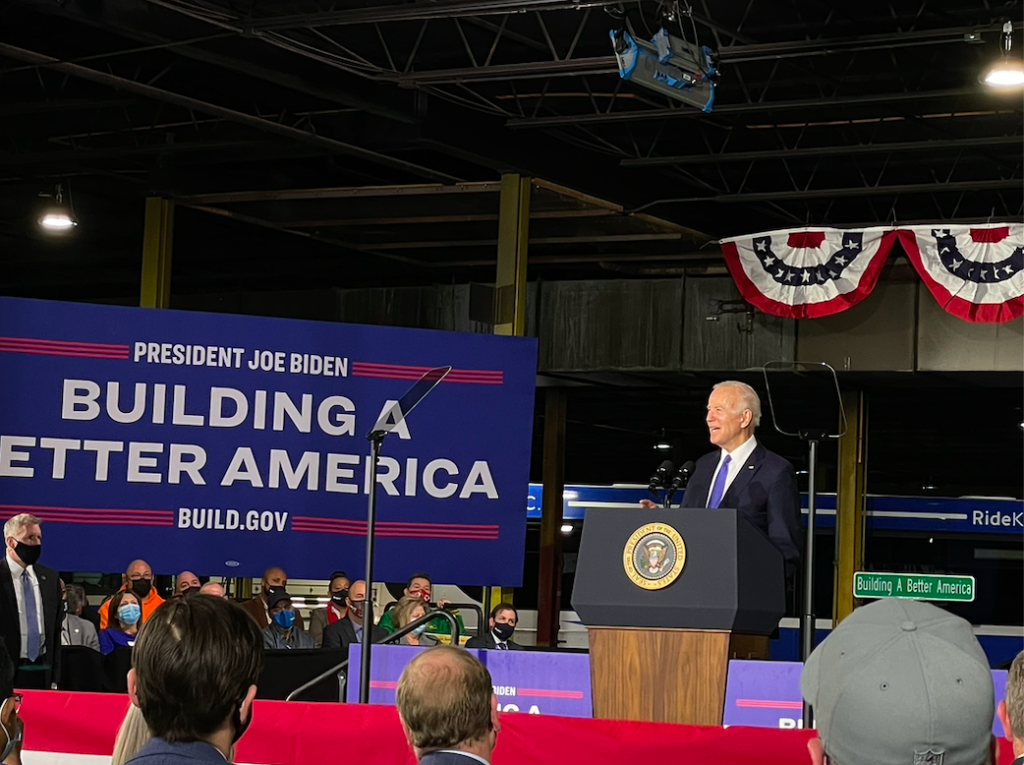
By Abby Hoover
President Joe Biden visited Kansas City, Mo., on December 8 to deliver remarks on how the Bipartisan Infrastructure Law delivers for Missourians by rebuilding roads and bridges, upgrading public transit, replacing water infrastructure, and creating good-paying, union jobs.
This is Biden’s first visit to Missouri as president. Accompanied by Mayor Quinton Lucas, Congressman Emanuel Cleaver II (MO-05) and Congresswoman Sharice Davids (KS-03), Biden toured KCATA facilities.
He addressed local union members, transportation employees, infrastructure experts and local government officials at the Kansas City Area Transportation Authority facility near the historic 18th and Vine district.
“Our Building America Better tour is going to give us a chance to meet people, where they work, to hear what the communities that they live in need, firsthand, and showcase what our Bipartisan Infrastructure Law, which will change their lives for the better, came about because we worked together,” Biden said.
Rudy Chavez, IBEW Local 124 member and Coordinator for the Missouri Apprentice Ready program, looks forward to more quality union jobs locally.
“For me, being a union member myself for the past 36 years, and in my capacity were I coordinate the program that is providing training for pre-apprenticeships, infrastructure spending to create more jobs is a godsend for me,” Chavez said. “It’d be a godsend for our communities. You know, those communities are women, minorities, veterans, second chance folks. So having the investment in construction jobs is a big deal.”
While Kansas City, Mo., doesn’t know yet how much money is coming its way, City Manager Bryan Platt has transformative projects in mind.
“There are some very large infrastructure projects that we aren’t able to fund because of the size of the project, but also because they’re just too many priorities for us right now,” Platt said. “We’ve got so much deferred maintenance that we have to catch up with, with our streets, our sewers, our water systems, our streetlights, all of the basic stuff that bigger projects – transformational projects like putting lit over 670 adding more lanes to the streetcar, affordable housing projects – we just don’t have enough money to do all those things.”
Platt said, hopefully, this will help Kansas City fill some of those gaps and catch up on deferred maintenance, but also move the City toward forward-thinking, transformational projects for the city.
“There’s a reason why they’re here, it’s not serendipitous,” Platt said. “We’ve been having good conversations with representatives and key leaders in DC for quite some time about some big projects and some big ideas we’ve got and we think there’s a lot of synergy and shared vision for this bill, and also the things that we’ve got going on here. We think we can both get wins out of it. So, it’s certainly helpful for us to get a lot of federal attention for Kansas City.”
Manny Abarca, Deputy District Director for U.S. Congressman Emanuel Cleaver and Kansas City’s sole Biden for President campaign staffer, felt thankful for the opportunity.
“I am thankful, thankful for our Congressman Emanuel Cleaver for supporting legislation that brings federal dollars to Kansas City and for his mentorship and the many opportunities he has given to me,” Abarca said. “Without him, Biden would not be such a strong supporter of the KC region.”
Dr. Mark Bedell, superintendent of Kansas City Public Schools, said the newly signed law will bring the nation to the 21st century standards and beyond.
“The broadband connectivity is a big deal,” Bedell said. “It’s something that I’ve been fighting and advocating for, not only on behalf of the urban school districts, but also our rural school districts, because in many cases with their situations, they don’t have towers.”
Bedell said a lack of broadband access creates a high degree of inequities for students.
“The other thing that’s a big takeaway for me as an educator is the opportunities that we have now to innovate with these resources,” Bedell said. “It’s a big part of what we’re trying to do with Blueprint 2030, redesign the system, dismantle it as is currently configured, make it a lot more agile school district that can respond at a much faster pace to how fast to market changes.”
Biden said this law will make high-speed internet affordable for everyone, creating jobs, helping farmers use precision agriculture, or letting doctors visit patients virtually.
“This law also builds out a resilience against extreme weather events fueled by climate change,” Biden said. “Actually, last year, extreme weather events cost this country $99 billion.”
The law will provide funding to upgrade power lines and electric grids. Biden said Missouri and Kansas are both in the top 10 states for power outages, and reminded the audience of recent flooding, intense storms and the 2011 Joplin tornado.
Bedell is optimistic, knowing that Kansas City’s students are now going to have opportunities for real world learning experiences that the district is building out through its Career Technology Education Program.
“To take advantage of these resources to rebuild our city, and our infrastructure is just a real big deal for me as a superintendent, definitely,” Bedell said. “I was just speaking to one of the union leaders a few minutes ago, and prior to COVID hitting, we were already in conversations around to partnering with the unions to begin to serve as mentors for our students, career mentors, and beginning to help our students kind of understand how to navigate that aspect of the workforce, how to advocate for themselves as future employees.”
Now Bedell is reigniting those conversations with local union leaders.
“Ninety five percent of the jobs created in the Bipartisan Infrastructure Law don’t require college education,” Biden said, adding that it creates jobs for blue collar Americans, and allows them to work through making available universal early childhood education .
Bedell said universal pre-kindergarten would be a game changer.
“Pre-K significantly increases the percentages of students who not only graduated out of high school, but go on to achieve at least two years of additional education at the collegiate level,” Bedell said. “It is something that’s been near and dear to my heart that we do want to figure out how we can have funding to be able to offer universal early childhood education.”
Over the last two weekends, Bedell had conversations with Congressman Cleaver about making it happen.
“This is something that I really think is getting ready to happen,” Bedell said. “It will be a reality. No more lip service. Let’s get some things done.”
Funds have not been awarded for projects yet. More information on the Bipartisan Infrastructure Law can be found at build.gov.
















